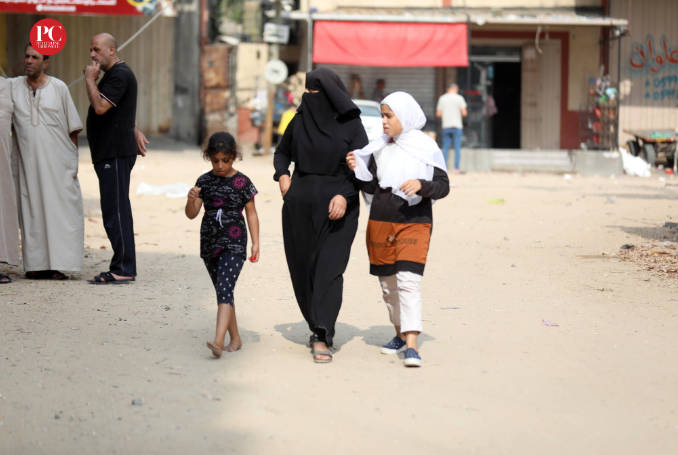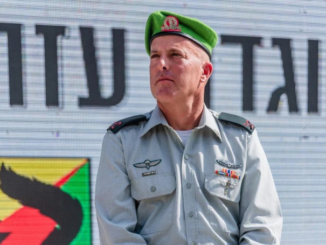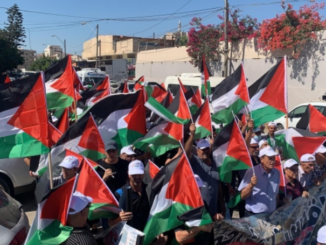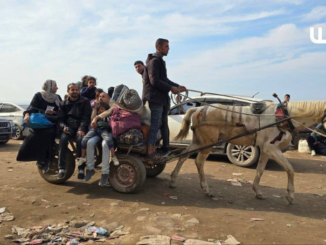
By Ramzy Baroud 
Thanks to Palestinian memory, Palestinians are once more united around their understanding of the past, the steadfastness of the present and the hope for a just future.
Inadvertently, Israel has pressed the reset button on its war with the Palestinian people, taking back the so-called conflict to square one.
Save a few self-serving Palestinian officials affiliated with the Palestinian Authority (PA), most Palestinians do not seem consumed with the return to the peace process, or even engaged in discussions about two state solutions.
The conversation among Palestinians is now mostly concerned with all aspects of the Palestinian struggle, starting with the ethnic cleansing of Palestine 76 years ago, an event known as the Nakba, or Catastrophe.
The Nakba is commemorated on May 15 of each year. The nature of the annual event, however, changes from one stage of the Palestinian struggle to the next. Indeed, the Nakba anniversary acquires its meaning from the political context of the time – it is elevated during times of hope, demoted during times of despair, defeat and infighting.
In the early phases of the Palestinian struggle, immediately following the expulsion of nearly 80 percent of the total Arab population of Palestine, the Right of Return was not a slogan or symbol. It was, at least in the minds of most refugees, a real possibility.
That right is enshrined in international law under United Nations General Assembly Resolution 194 of December 1948. At the time, Palestinian exile was perceived to be temporary – thus, the term ‘temporary shelters’ associated with the humble dwellings of refugee encampments immediately after the war. These refugee camps extended from Palestine itself to other countries throughout the Middle East.
Back then, Arab nationalism was a powerful political notion that defined a pan-Arab political discourse, which centered in Egypt, Syria and Iraq. With the passage of time, however, it became clear that Arab liberators were not coming to free Palestine, and that UN resolutions on Palestine were not meant to be implemented. They were mere ‘ink on paper’, Palestinians would often utter.
Experience taught Palestinians to be cynical about lofty promises, especially when the UN-supplied ‘temporary shelters’ became a permanent, everyday reality.
The Palestinians continued to commemorate the Nakba anyway, because their collective memory became their main weapon of fighting back against Israeli erasure.
The rise of the Palestine Liberation Organization (PLO) in the 1960s, its emphasis on the liberation of all of Palestine and its use of revolutionary slogans and armed struggle resurrected hopes among ordinary Palestinians that the Right of Return was still possible.
These hopes were dashed, however, after the PLO’s forced exile from Lebanon in 1982, and the signing of the Oslo Accords between Israel and increasingly irrelevant Palestinian leadership in 1993.
Oslo and its fraudulent US-led peace process allowed Israel to conclude what it started during the Palestinian Nakba. Israel’s greatest achievement was creating a Palestinian entity that would help it manage its final victory over the Palestinian people. The PA became that entity, leading to widening the factional and class divides in Palestinian society.
Since then, Israel managed to annex large parts of what remained of historic Palestine, control dissenting Palestinians through the PA and besiege Gaza as an act of collective punishment for its ongoing resistance. All wars fought against Gaza in recent years were meant to serve as a reminder to Palestinians of Israel’s might and Palestinian inferiority.
Palestinians, however, continued to commemorate the Nakba, although the Right of Return, as a political concept, became marginal, hardly ever discussed, neither by Israel nor the PA as a pressing political issue.
Recent years indicated that Israel was ready to move past all of this into a whole new stage of politics, one that does not pay the slightest attention to Palestinian aspirations.
The Israeli occupation, illegal settlements, occupied Jerusalem and all other critical topics that mattered to Palestinians ceased to be part of Israeli election campaigns, or even part of the Israeli political discourse, in general. This mindset defined all mainstream Israeli political groups, from the extreme right to the left.
All that seemed to matter to Israel was the expansion of the illegal settlements, the annexation of the West Bank, the normalization of its military occupation and the occasional military raids and wars aimed at crushing the Resistance.
October 7, however, changed all of that. The new political discourse emerging from Gaza following the war has forced an international rethink about Palestine and the struggle of the Palestinians.
This was crystallized in the words of Chinese Foreign Ministry spokesperson, Wang Wenbin, who addressed, in a press conference on May 15, the Palestinian Nakba.
“Seventy-six years on, the historical injustice suffered by the Palestinian people, far from being redressed, has further worsened,” Wenbin said, linking the past to the present, Gaza to historic Palestine.
This new discourse is now taking hold, and the segmentation of Palestinian history resulting from Oslo is quickly disappearing in favor of a wholesome approach to justice in Palestine. Though Washington and a few of its western allies insist on returning to the status quo of endless negotiations, others are no longer beholden to that kind of stifling, self-serving discourse.
This shift in perspective was not only a result of the failure of Oslo, and the extent of the Israeli barbarity and genocide in Gaza, but mainly because of the steadfastness and resistance of the Palestinians themselves.
It turned out that collective memory was not just an academic notion, but a weapon in the hands of ordinary people.
Thanks to Palestinian memory, Palestinians are once more united around their understanding of the past, the steadfastness of the present and the hope for a just future.

– Ramzy Baroud is a journalist and the Editor of The Palestine Chronicle. He is the author of six books. His latest book, co-edited with Ilan Pappé, is “Our Vision for Liberation: Engaged Palestinian Leaders and Intellectuals Speak out”. Dr. Baroud is a Non-resident Senior Research Fellow at the Center for Islam and Global Affairs (CIGA). His website is www.ramzybaroud.net







